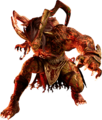Difference between revisions of "Ifrit"
| Line 5: | Line 5: | ||
== Etymology == | == Etymology == | ||
The term is a weird one because it | The term ''ifrit'' is a weird one because only variants of it appear in Arabic poetry before the Quran, and even in the Quran it only appears once, in Surah 27. In it, King Solomon asks his people which of them can bring him the throne of the Queen of Sheba. Then "A '''powerful one''' from among the jinn said, 'I will bring it to you before you rise from your place, and indeed, I am for this [task] strong and trustworthy.'" | ||
The term "powerful one" there is ''ifritun'', coming from ''ifrit'', meaning "powerful, rebellious." In other words, when Solomon calls for volunteers to take the Queen of Sheba's throne, a fearsome, loose-cannon of a jinn raises his hand—that's an ifrit.<ref>And if you're wondering, in the next verse, a scholar of the Torah speaks up and volunteers as well. Solomon gives him the job over the ifrit, and the guy brings him the throne in "the blink of an eye."</ref> | The term "powerful one" there is ''ifritun'', coming from ''ifrit'', meaning "powerful, rebellious." In other words, when Solomon calls for volunteers to take the Queen of Sheba's throne, a fearsome, loose-cannon of a jinn raises his hand—that's an ifrit.<ref>And if you're wondering, in the next verse, a scholar of the Torah speaks up and volunteers as well. Solomon gives him the job over the ifrit, and the guy brings him the throne in "the blink of an eye."</ref> | ||
Revision as of 17:52, 27 December 2022
If you're looking for the 12-foot-tall elemental genies called "efreet" in D&D, see jagur.
Ifrit (I say "ih-FREET"),[1] also spelled efreet, are legendary beings from Islamic theology. They are generally believed to be a class of powerful demons.
Etymology
The term ifrit is a weird one because only variants of it appear in Arabic poetry before the Quran, and even in the Quran it only appears once, in Surah 27. In it, King Solomon asks his people which of them can bring him the throne of the Queen of Sheba. Then "A powerful one from among the jinn said, 'I will bring it to you before you rise from your place, and indeed, I am for this [task] strong and trustworthy.'"
The term "powerful one" there is ifritun, coming from ifrit, meaning "powerful, rebellious." In other words, when Solomon calls for volunteers to take the Queen of Sheba's throne, a fearsome, loose-cannon of a jinn raises his hand—that's an ifrit.[2]
